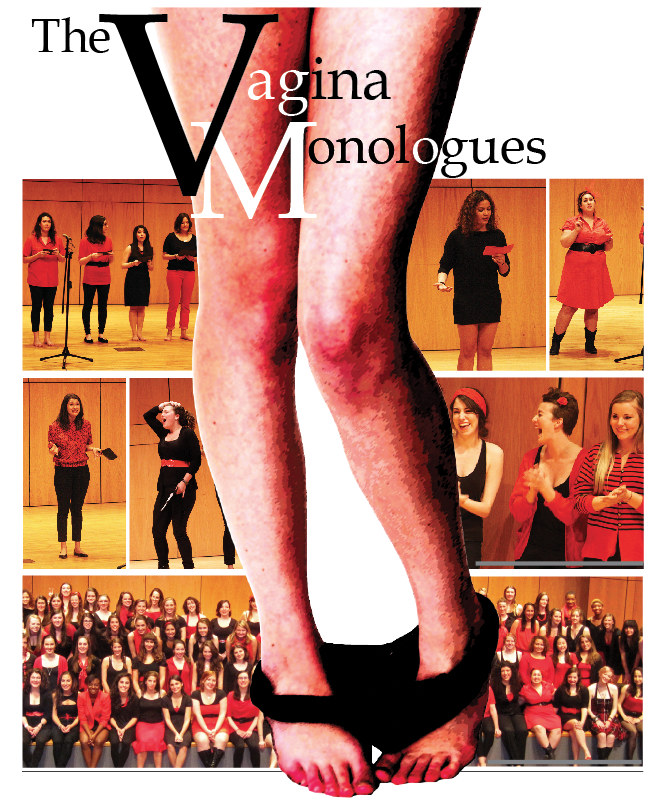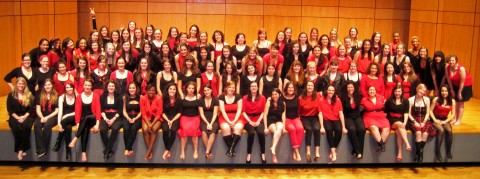 I did not plan on attending the Vagina Monologues. As a man, I found the title less than welcoming. It sounded exclusive, as though it was a performance solely for women and by women, and I suppose it made me squeamish as well. I had no intention of overstepping my own boundaries.
I did not plan on attending the Vagina Monologues. As a man, I found the title less than welcoming. It sounded exclusive, as though it was a performance solely for women and by women, and I suppose it made me squeamish as well. I had no intention of overstepping my own boundaries.
Upon expressing my decision not to attend to my friends performing in the Monologues, I was immediately bombarded with opposition. I tried to explain that I was uncomfortable with the subject matter, and that I didn’t think I belonged in the audience. They scoffed at my discomfort, and told me to suck it up. They told me that the Vagina Monologues is important, relevant and pivotal in the movement to stop violence against women. They also told me that I was a shitty friend if I didn’t attend and support their hard work. And so, on Friday evening outside of Evans Hall, I found myself with ticket in hand, waiting to enter the Monologues.
The Vagina Monologues was written in 1996 by American playwright and feminist activist Eve Ensler. The monologues are based off of the stories and experiences of over 200 women who Ensler interviewed about their views on their bodies, sex and relationships and violence against women. The monologues are also the foundation for V-Day, established in 1988. V-Day, which takes place on February 14, is a movement to end and raise awareness about violence against women. The Vagina Monologues is performed annually in conjunction with V-Day in order to raise money for the cause.
When Eve Ensler launched V-Day, an activist movement, in 1988, she stated that the purpose of the Vagina Monologues had changed from a celebration of femininity to a campaign to end violence against women. This transformation seemed to be reflected in Conn’s performance of the monologues, as the performances after the intermission confronted much heavier and graver topics than those that had been performed before. These topics included the rape of twenty to seventy thousand women, who were raped during the war in Yugoslavia, and also the horrifying experiences faced by a male-to-female transsexual.
After an initial introduction by Megan Reback ’12, this year’s producer of the show, Cyndi Lauper’s ever upbeat “Girls Just Want to Have Fun” came on over the speakers, and the entire cast took over the stage and aisles of Evans, dancing to the music in their red and black garb. When the music faded out, the cast proceeded to introduce the vagina by its several different nicknames. The first few nicknames were relatively familiar and straightforward, such as “pussy,” “cooch” and “punani.” However, as each cast member contributed their own label, the names began to get progressively more flavorful, with a handful of crowd pleasers such as “It’s Britney, bitch,” “Justin Beaver,” and “Notorious V-A-G.”
The first few monologues elicited many laughs and applause from the audience. “The Flood” was performed by four different women, speaking with slightly varied but equally hilarious New York Jewish accents. The monologue described one woman’s embarrassment after having had an accidental “flood” on the passenger seat of her date’s car. Because of her embarrassment, and her date’s less than kind reaction to the situation, the woman, as she put it, “closed up shop down there.”
Molly Bienstock ’14 was one of the performers in “The Flood.” Bienstock described her experience performing in the monologue as “empowering, in a really tangible way. You hear your own words, but you also see your hard work reflected in the other performers on stage with you.”
Bienstock also explained that over the course of their rehearsals, she had become extremely close with her cast mates, and that she knows of girls in other monologues who feel similarly about their co-performers.
As for the audience, Bienstock said that she hoped that other women came away from the performance feeling more aware of their bodies and more comfortable with themselves.
“It’s helpful for other women seeing one story, one perspective, told by four different people. All the same fashion, but a little bit of distinction,” concluded Bienstock.
The next monologue involved a “Vagina Workshop,” where with the help of an instructor and a mirror, women would learn to explore and pleasure themselves. At this point in the monologues, I began thinking about my penis, as is often the case. For men, masturbation is somewhat less than ceremonious. It’s relatively easy, can be done quickly and is unaffected by time or place. This monologue, though, is told be the perspective of an adult woman who, up until that point, had never masturbated and had only experienced an orgasm on accidental occasions, such as riding a horse.
However, while a woman’s orgasms may be fewer and farther between, the performers in the monologue described it as a transcending, spiritual and empowering event. While the anatomical differences between a man and woman are obvious, for me, this monologue brought to light the vast differences between a man’s and woman’s sexual experiences.
Until intermission, the monologues continued in their lighthearted and celebratory manner, save for a more weighty performance called “What if I Told You I Didn’t Have a Vagina.” This piece brought to light the horrors faced by women in the Congo, where a war over minerals has resulted in hundreds of thousands of women being sexually attacked and tortured.
Still, there were plenty of laughs to lift some of the weight of the more intense monologues. One of the most memorable pieces was titled “The Woman Who Loved to Make Vaginas Happy,” recounting the life of a woman who left her corporate job to work as a dominatrix. This scene, performed by Catherine Monahon ’12 and Eliza Bryant ’12, concluded with the two women passionately reenacting the different types of moans that the dominatrix had induced in her clients.
Though The Vagina Monologues and V-Day undoubtedly support an important cause, there is some controversy surrounding the play, much of it focused on one piece in particular. The piece follows one woman’s childhood where, after being raped by her father’s friend at the age of ten, she hides her sexuality and isolates herself from men. In the piece that was performed at Connecticut College, the woman recalls that, at the age of sixteen, she had an affair with an older woman which helped her rediscover and heal her sexuality. In the original version that aired in the 90s, however, the affair takes place when the girl is only thirteen. This piece is also controversial because critics believe that it associates heterosexuality with violence and favors homosexuality, even when involving a thirteen (or sixteen) year old.
Even though Ensler wrote the play in the early nineties, the play maintains its timelessness by including recent events, such as the earthquake in Haiti and controversial Facebook “Rape Pages.”
As a man, I went into the play thinking it would make me uncomfortable. I was right. However, more than that it made me blush, The Vagina Monologues made me understand the depth of the issues that women face, and brought to light obstacles that women overcome that I did not know even existed before.
“I hope that the Vagina Monologues shows that feminism can become something that isn’t intimidating; rather, combining activism and art helps both women and men relate to feminism,” said Reback.
I agree. So, to all the men that did not attend for any variety of reasons, I say this; next year, grow a pair and see The Vagina Monologues.











